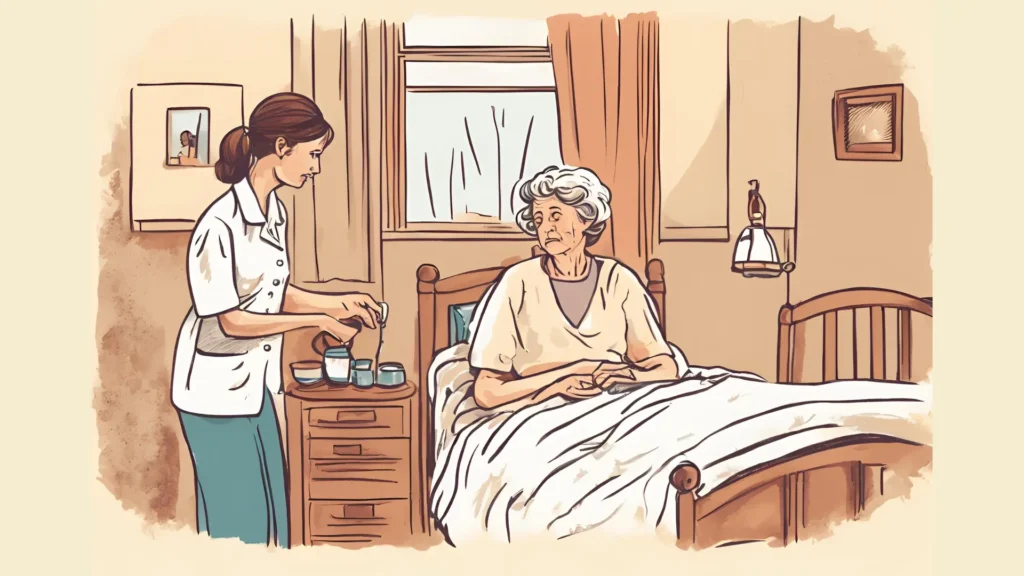Today, we will be talking about the 7 Stages of Lewy Body Dementia. Lewy Body Dementia (LBD) is a significant and progressive neurological disorder, ranking as the second most common form of dementia behind Alzheimer’s disease. It is characterized by the accumulation of abnormal protein deposits, called Lewy bodies, in the brain. These deposits disrupt normal brain function and cause a range of symptoms that affect cognitive abilities, motor functions, and behavior.
Unlike Alzheimer’s disease, LBD often starts with noticeable hallucinations and specific behavior changes early on. The progression of LBD can be divided into seven stages, each marked by a worsening of cognitive decline, physical deterioration, and behavioral changes that increasingly impact daily life.
Stage 1: Early Symptoms
The first stage of Lewy Body Dementia is the Early Symptoms. At the beginning of Lewy Body Dementia, individuals may start to experience a range of small but important changes in behavior and thinking, marking the start of a complex journey through the stages of Lewy Body Dementia. The early symptoms show the first signs of the neurological changes happening.
- Subtle Behavioral Changes and Mild Cognitive Issues: People may notice a gradual shift in their ability to make decisions, along with changes in their behavior that can seem out of character or unexplained.
- Fluctuating Alertness: One day may bring clarity, while another is filled with confusion, suggesting an unpredictable thinking pattern that is common in this stage.
- Visual Hallucinations: These are not just illusions but clear and often repeating experiences that can be distressing or disorienting for those affected.
- REM Sleep Behavior Disorder: The boundaries between dreams and reality become unclear as people physically act out their dreams, leading to disturbed sleep and potential safety issues.
The impact on memory starts slowly, mainly affecting short-term recall. For example, individuals might forget recent conversations or misplace items more often than before.
Physical symptoms also begin to show:
- Tremors: A slight, involuntary trembling or shaking may become noticeable, often starting in one hand.
- Muscle Rigidity: Stiffness in the limbs or torso can make everyday movements harder.
- Bradykinesia: Actions may take longer to start and finish due to a general slowing down of movement.
It’s important to identify these signs early on to effectively manage Lewy Body Dementia stages. With the right actions and support, individuals can maintain a better quality of life despite experiencing these symptoms.
Stage 2: Mild Cognitive Impairment (MCI)
The second stage of Lewy Body Dementia is Mild Cognitive Impairment (MCI). As Lewy Body Dementia progresses through its stages, individuals move into a phase often referred to as Mild Cognitive Impairment (MCI). During this stage of Lewy Body Dementia, the subtle cognitive issues that were present in the early symptoms stage begin to intensify. Memory problems become more pronounced; individuals may struggle with recalling recent events or conversations, and they may repeat themselves without realizing it.
Language difficulties also emerge, with individuals finding it harder to find the right words in a conversation or to follow complex discussions. This can be particularly frustrating for those affected, as they are aware of these challenges but may not always understand why they are occurring.
- Cognitive Decline: The hallmark of this stage is a noticeable drop in cognitive function beyond what might be expected from normal aging.
- Memory Problems: Recollection of recent information becomes challenging and can disrupt daily activities.
- Language Difficulties: Conversing becomes more laborious, with word-finding pauses and decreased fluency.
Recognition of these symptoms is crucial for adapting care strategies to support individuals through this phase of Lewy Body Dementia stages. With appropriate interventions and support, people at this stage can often continue to engage in their daily lives with some level of independence.
Stage 3: Mild Dementia
The third stage of Lewy Body Dementia is Mild Dementia. At this stage of Lewy Body Dementia, individuals experience a noticeable decline in their problem-solving abilities. Tasks that used to be easy may now be difficult, and they may struggle with planning, organizing, and completing complex activities. They may also have trouble finding the right words and understanding complicated sentences as they progress through the stages of Lewy Body Dementia.
Emotional Changes
Along with the cognitive symptoms, there are often changes in emotions:
- Anxiety: Feeling more worried or fearful about everyday things or future events.
- Depression: Having ongoing feelings of sadness or losing interest in things they used to enjoy.
- Apathy: Showing little motivation or not caring about activities they once liked.
These symptoms can greatly impact a person’s quality of life and affect their relationships and social interactions. It’s important to recognize these changes so that care strategies can be adjusted to better support those living with Lewy Body Dementia at this stage.
Stage 4: Moderate Dementia
The fourth stage of Lewy Body Dementia is Moderate Dementia. During this stage, individuals experience a significant decline in cognitive abilities. This phase is particularly challenging due to:
- Severe memory problems: Individuals may struggle to recall recent events or recognize familiar faces.
- Executive dysfunction: Planning, organizing, and completing tasks become increasingly difficult, affecting daily life.
- Heightened agitation: Emotional distress manifests more frequently, causing restlessness and irritability.
- Episodes of confusion: Disorientation regarding time, place, and personal identity often occurs.
- Paranoid delusions: Misperceptions lead to unfounded suspicions or fears.
These symptoms pose complex challenges for caregivers who must adapt to the evolving needs of individuals with moderate dementia as they progress through the stages of Lewy Body Dementia. Care strategies often require adjustments to ensure safety and manage behavioral symptoms effectively.
Stage 5: Moderately Severe Dementia
The fifth stage of Lewy Body Dementia is Moderately Severe Dementia. During this stage, individuals experience a significant decline in their ability to communicate effectively. This stage is characterized by:
- A noticeable decrease in the ability to articulate thoughts or participate in conversations, often leading to frustration and withdrawal.
- Reduced comprehension, making it difficult for individuals to understand complex sentences or follow along with conversations.
Challenges with Communication
In addition to communication barriers, people in this stage face significant difficulty with problem-solving tasks. Everyday activities that require decision-making, such as managing finances or planning a meal, become increasingly challenging. The culmination of these cognitive deficits can manifest as:
- A reliance on assistance for basic tasks like dressing or bathing, due to the inability to process steps involved.
- More pronounced disorientation and confusion, even in familiar environments.
The struggles in daily functioning and communication increase the need for comprehensive support from caregivers and healthcare professionals.
Stage 6: Severe Dementia
In Stage 6 of Lewy Body Dementia stages, individuals face a profound shift in their needs and abilities. The loss of independence becomes evident as they require extensive assistance with basic care tasks. Communication often dwindles to a point where verbal interactions may no longer be possible. Caregivers observe that loved ones might experience:
- Severe agitation, which can manifest as restlessness or verbal outbursts.
- Aggression towards themselves or others, posing safety concerns.
- Visual hallucinations becoming more pronounced, leading to further confusion and distress.
These behavioral changes can be distressing for both the individual and their caregivers. They necessitate a compassionate approach, understanding, and sometimes the adjustment of care strategies to manage these symptoms. Creating a calm environment and providing structured support can help in mitigating some of the challenges associated with this stage of Lewy Body Dementia.
Stage 7: End-Stage Dementia
At this advanced point in Lewy Body Dementia stages, individuals face a severe and all-encompassing decline in their cognitive and physical abilities. This stage is marked by:
- Complete Dependence: The need for round-the-clock care is essential as individuals can no longer perform daily tasks independently.
- Speech Difficulties: The ability to communicate effectively deteriorates drastically, often resulting in near-total loss of speech.
- Memory Loss: A profound loss of both recent and autobiographical memories becomes apparent during this stage.
- Physical Decline: Symptoms such as muscle stiffness and immobility become more prevalent, severely limiting mobility.
Given these challenges, palliative care becomes a cornerstone of treatment, focusing on comfort rather than cure. Patients receive compassionate care aimed at managing symptoms and improving quality of life. Families too are supported during this difficult time, as they navigate complex emotions and caregiving responsibilities.
The transition to supportive approaches underscores the importance of sensitivity towards the needs of those experiencing end-stage dementia and their loved ones.
How can the Stages of Lewy Body Dementia be treated?

While the average lifespan after a diagnosis with Lewy Body Dementia (LBD) is approximately 8 to 12 years, and there is no cure for LBD, treatment focuses on improving quality of life through symptom management. Medications for symptom relief, such as cholinesterase inhibitors donepezil and rivastigmine, can be effective for cognitive symptoms. Other medications might target movement difficulties or help reduce hallucinations.
Care Management Strategies:
- Specialized Dementia Care Units: These facilities offer tailored care designed to meet the complex needs of individuals with LBD.
- Assistive Technologies: Devices and software can aid in daily tasks, communication, and safety, helping maintain independence for as long as possible.
- Psychosocial Interventions: Activities that engage patients socially and cognitively can support well-being and potentially slow the progression of symptoms.
Support Networks:
- Family and Friends: Their involvement is crucial for emotional support and hands-on caregiving.
- Professional Home Care Services: Trained caregivers relieve family members by providing expert care, allowing them to rest and manage their own health.
- Local Community Resources: Organizations may offer services like respite care, support groups, and educational programs for patients and caregivers.
By leveraging a combination of these approaches, caregivers can create a nurturing environment where those with LBD are supported on both medical and personal fronts.
7 Stages of Lewy Body Dementia: Raising Awareness

Raising awareness about Lewy Body Dementia is crucial. It helps in diminishing stigma, fostering environments where early detection is more likely, and bolsters support for research initiatives. When awareness spreads:
- People gain a better understanding of the challenges faced by those living with LBD and their caregivers.
- It creates opportunities for community support and opens up discussions around neurological diseases.
- Encourages funding and interest in scientific research aimed at uncovering new treatments and ultimately a cure.
By shining a light on the different stages of Lewy Body Dementia, society takes a step toward improved quality of life for those affected, as well as for their families who stand alongside them.
Navigating the 7 Stages of Lewy Body Dementia Journey

The 7 Stages of Lewy Body Dementia is a difficult journey for those affected and their loved ones. It highlights the importance of a caring approach that combines empathy and comprehensive care methods.
Better support systems can greatly enhance the quality of life for people dealing with the 7 Stages of Lewy Body Dementia, making sure they receive proper treatment and consideration during this challenging time. It is by working together that families can better understand and cope with the difficulties of Lewy Body Dementia.
Read More: Have Your Loved One Show These Warning Signs of Dementia?


